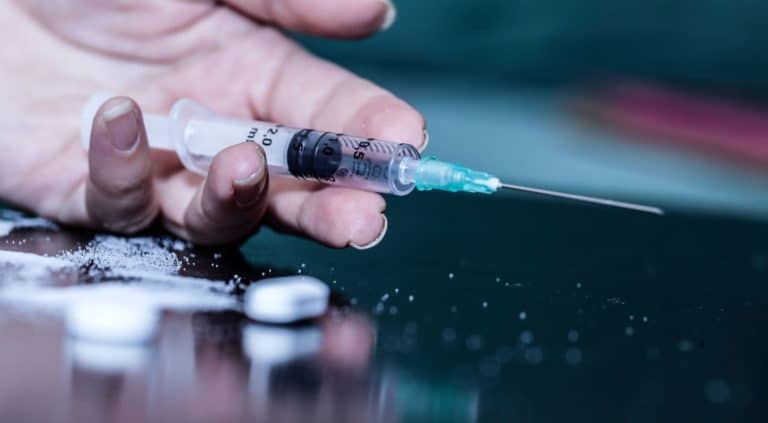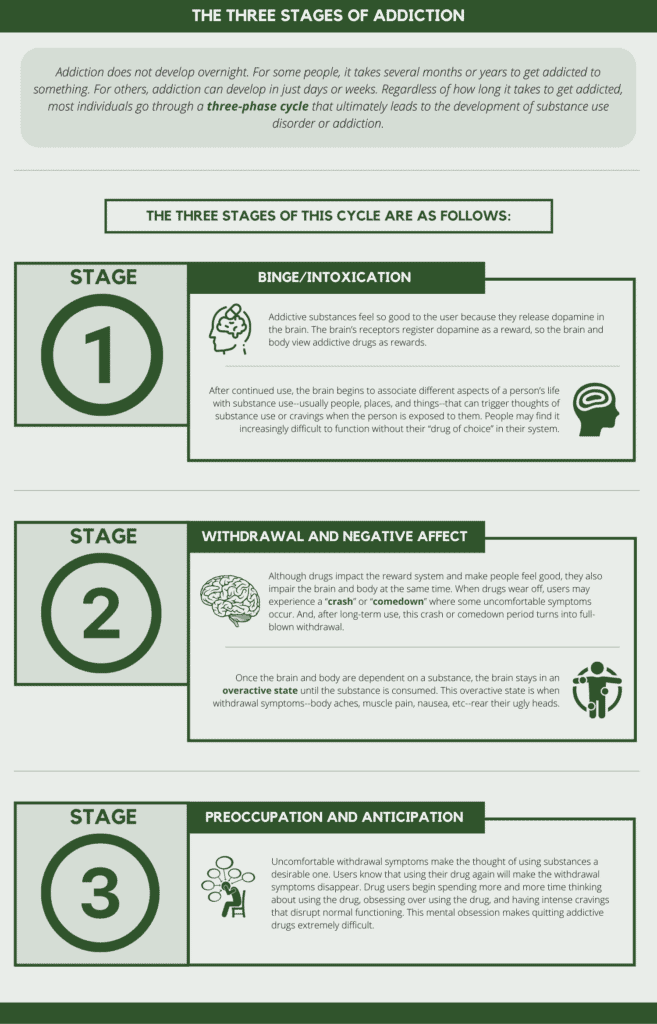Addiction does not develop overnight. For some people, it takes several months or years to get addicted to something. For others, addiction can develop in just days or weeks. Regardless of how long it takes to get addicted, most individuals go through a three-phase cycle that ultimately leads to the development of substance use disorder or addiction.
This three-phase cycle consists of binging on a substance to feel its euphoric effects, coming down from the high and experiencing negative effects, and craving or looking forward to the next high. Drug users continue this cycle as their addiction gets worse until they hit rock bottom: in jail, in court-mandated treatment, or dead. Understanding these three stages of addiction can help friends and family understand what it’s like to be stuck in this devastating cycle–and how they can help an addicted loved one get out of it.
Study Reveals Three Stages of Addiction
Researchers’ work that was published in the New England Journal of Medicine describes addiction as a repeating cycle with three stages. According to their studies, each stage is associated with a different region of the brain. Understanding each of these stages and which areas of the brain are affected has helped health experts across the world gain a better understanding of addiction and how to treat it.[1,2]
The three stages of this cycle are as follows:
- Binge/intoxication – An individual consumes an intoxicating substance and experiences rewarding or feel-good effects. This stage is associated with the basal ganglia, an area of the brain associated with motivation, reward, habits, and routine behaviors.
- Withdrawal/negative affect – In the absence of a substance, an individual goes into a negative emotional or physical state. This stage is associated with the extended amygdala, a part of the brain that regulates the stress or “fight or flight” response and other bodily processes.
- Preoccupation/anticipation – After a period of abstinence, a person seeks substances again, and returns to the first phase of the cycle. This stage is associated with the prefrontal cortex, a part of the brain that is responsible for many cognitive processes like decision making, time management, emotions, and impulses.
Stage One: Binge and Intoxication
Addictive substances feel so good to the user because they release dopamine in the brain. The brain’s receptors register dopamine as a reward, so the brain and body view addictive drugs as rewards. After continued use, the brain begins to associate different aspects of a person’s life with substance use–usually people, places, and things–that can trigger thoughts of substance use or cravings when the person is exposed to them. People may find it increasingly difficult to function without their “drug of choice” in their system.
Stage Two: Withdrawal and Negative Affect
Although drugs impact the reward system and make people feel good, they also impair the brain and body at the same time. When drugs wear off, users may experience a “crash” or “comedown” where some uncomfortable symptoms occur. And, after long-term use, this crash or comedown period turns into full-blown withdrawal. Once the brain and body are dependent on a substance, the brain stays in an overactive state until the substance is consumed. This overactive state is when withdrawal symptoms–body aches, muscle pain, nausea, etc–rear their ugly heads.
Stage Three: Preoccupation and Anticipation
Uncomfortable withdrawal symptoms make the thought of using substances a desirable one. Users know that using their drug again will make the withdrawal symptoms disappear. Drug users begin spending more and more time thinking about using the drug, obsessing over using the drug, and having intense cravings that disrupt normal functioning. This mental obsession makes quitting addictive drugs extremely difficult.
When Should I Seek Treatment For My Addiction?
Addiction affects all areas of a person’s life. Regardless of which of the three stages of addiction you are caught up in, they are all a part of a cycle that doesn’t end without professional help.
The more often you abuse drugs, the faster your addiction will progress. In many cases, people don’t even realize they are addicted until they have reached a place of emotional despair. Leaving your addiction untreated can result in a variety of consequences, such as:
- The inability to perform well at work or maintain your career
- Damaged relationships
- Health problems as a result of substance abuse
- Financial problems
- Legal consequences
The earlier you seek treatment, the easier it will be to stop using drugs and turn your life around. However, it’s never too late for treatment, either. You should seek help as soon as you are ready to do so.
Find Help Before It’s Too Late
According to recent data from the CDC, 2020 was the deadliest year in drug overdose deaths recorded in all time. Addiction is not a joke, and it is nothing to take lightly. Last year alone, more than 93,000 individuals lost their lives due to drug overdose.[3] And, if you don’t get help sooner than later, you could end up becoming part of that statistic.
It’s never too early to get help. Here a Woburn Addiction Treatment, we’ll meet you exactly where you are at and provide you with resources to improve your life and work toward your goals. It doesn’t matter how far you’ve fallen or how far you think you have left to go–today is the day to get help. Contact us today to get started.
References:



